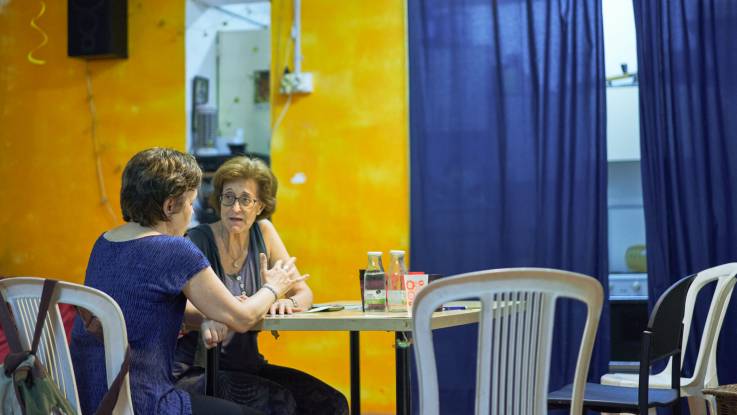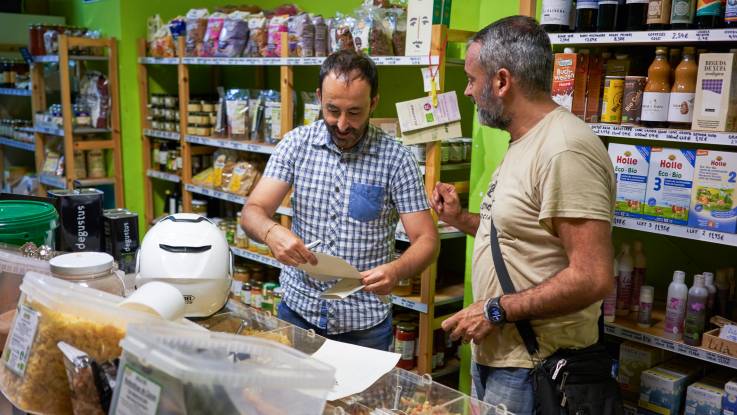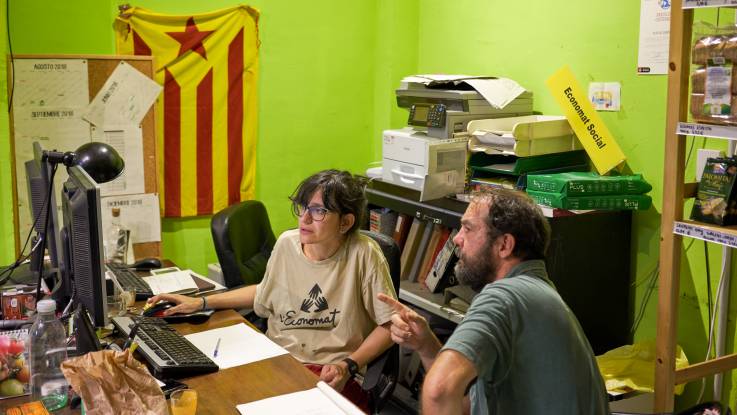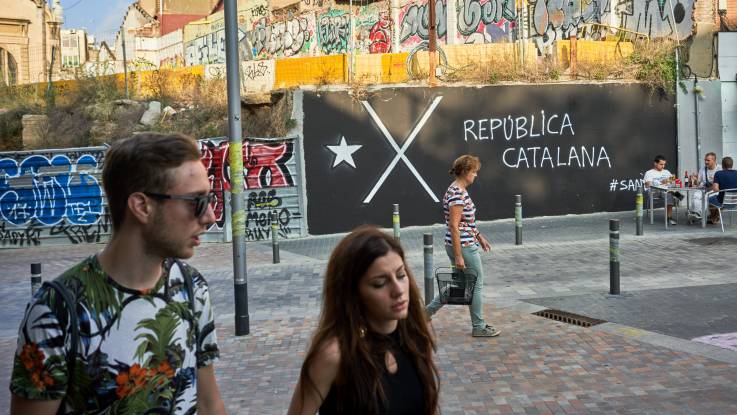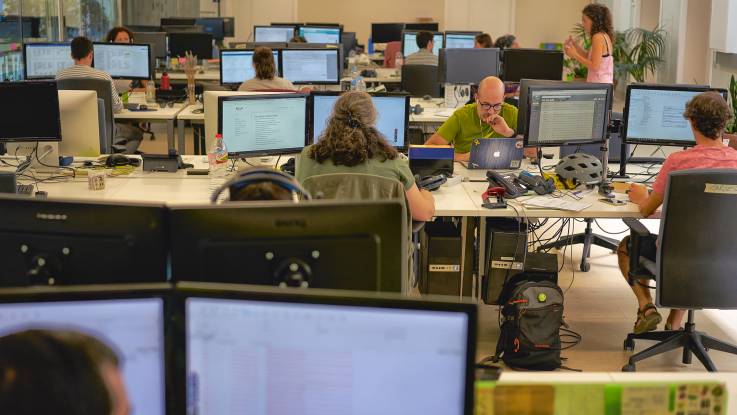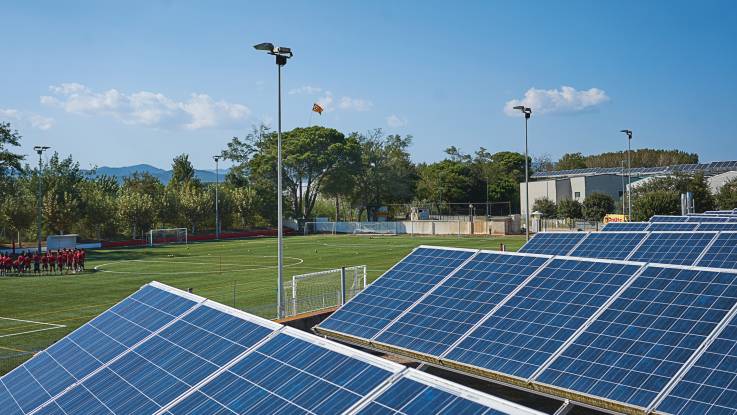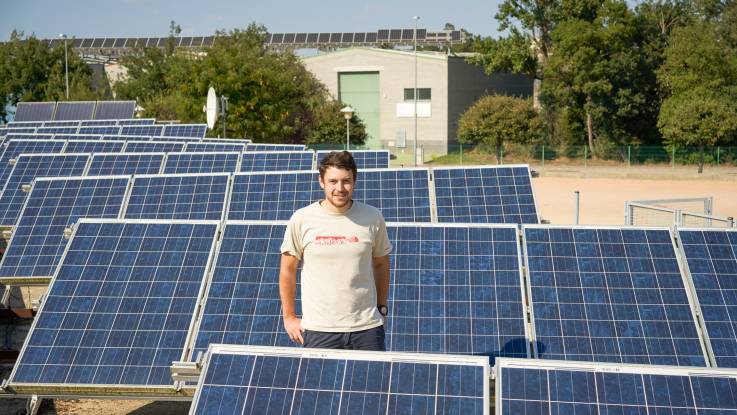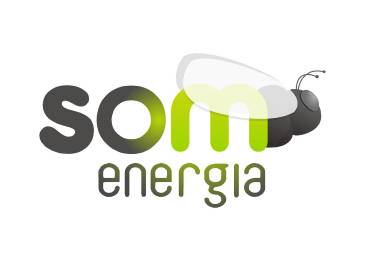We are energy
A report by Sebastian Drescher
Som Energia is the largest green energy cooperative in Spain, and its success is linked to the Catalan independence movement.
The cooperative only recently moved into its new office in the University of Girona’s Science and Technology Park, and a number of boxes are yet to be unpacked. The former premises had become too small – not for the first time. The new open-plan office finally provides enough space for the company’s employees, which now number 70. Much of the predominantly young team is wearing shorts and sandals in the late summer weather, and a pram is parked next to one of the desks. But although the workplace exudes start-up charm, Som Energia (Catalan for “We are energy”) is in fact a well-established company.
Much of the cooperative’s success is down to 44-year-old Marc Roselló, one of the four managing directors. He does not have his own office; instead, he receives visitors on the terrace of the cafeteria. Over a cappuccino and handrolled cigarettes, Roselló tells the story of how he set up Som Energia eight years ago with a few fellow climate activists.
Their own energy
Back then, Roselló says, it was impossible for him, as a private consumer, to purchase clean energy. Spain’s big electricity companies Endesa and Iberdrola, which still dominate the market today, simply didn’t offer such a thing. He therefore heeded the call of Gijsbert Huijink, a Dutchman who was teaching at the University of Girona, and decided to take matters into his own hands. Huijink wanted to bring the green energy cooperative model that he knew from his home country to Catalonia. “It was Gijsbert Huijink who first introduced us to the idea that we citizens could change the energy supply system ourselves,” Roselló recalls. “I found that vision very inspiring.”
In late 2010, some 150 people came together in Girona to launch Som Energia. Roselló, who was unemployed at the time, was one of three cooperative members who ran the office – on a voluntary basis in the first year. The renewable energy engineer had to get to grips with the complex Spanish electricity market, and sought advice from cooperatives in other European countries. Eight months later, Som Energia’s first electricity contract was signed.
We knew from the start that we would have to do things differently.
Som Energia still sources most of its green electricity from small-scale producers, but it also started building its own production facilities early on. The cooperative’s first photovoltaic system, with a capacity of 100 kilowatts (kw), was installed on the roof of the training centre of the local football club, FC Girona. More were quickly set up in southern Spain. These were all financed with the cooperative’s own capital, raised by the one-off payment of 100 Euros that each member contributes upon signing up. Roselló explains that the financial crisis made it difficult to obtain money from banks: “We knew from the start that we would have to do things differently.”
Pie Chart: Electricity mix in Spain 2017, Percentage share of energy generation,
Fossil fuels: 44,8%,
Nuclear electricity, 21,2%,
Wind energy: 18,2%,
Hydropower: 7,0%
Solar energy : 3,2%,
Solar thermal energy: 2,0%
Others like Biomass, Geothermal energy, etc: 1,9%, and
Other Renewable* like Agro- or biofuels etc.: 1,7%.
Today, Som Energia has almost 53,000 members from all over Spain, with more than 20,000 new sign-ups since the beginning of 2017 – and this despite the fact it has no marketing department or advertising budget. Roselló believes the cooperative’s widespread popularity is a result of the economic crisis and many people’s desire for genuine alternatives. “We have an idea for an alternative approach, and we give people the opportunity to be a part of that idea,” he says.
A transregional network
Those people include Anna Comatrena, a woman in her mid-sixties who is currently sitting in the back room of a food cooperative in Barcelona. The store at the front is filled with the smell of basil and mint, and boxes of nuts and vegetables are displayed alongside organic juices and natural cosmetics. Every third Wednesday of the month, Comatrena provides information about Som Energia, answers questions from interested customers, and explains the process of switching to the cooperative from a major electricity supplier.
Comatrena is an active member of a local Som Energia group, dozens of which now exist in cities all across Spain. She tells us there are around 30 volunteers in Barcelona alone. These groups provide local points of contact and give members the opportunity to discuss issues concerning the cooperative. Once a year, when Som Energia’s general assembly is held in Girona, the regional groups participate online and get to vote on fundamental decisions – such as whether the cooperative should also invest in wind power, or how high the electricity price margin should be.
She may not be an energy expert, Comatrena says, but it is important to her that she can have her say. The pensioner is passionate about cooperatives: in addition to Som Energia, she is involved in six others, including an initiative striving to create affordable housing. She also tells us about the new ideas that emerge at Som Energia’s local group meetings. For example, some members clubbed together to purchase five electric cars, while others have jointly invested in solar panels.
Community spirit and quiet rebellion
Cooperative businesses have a long tradition here in Sants, an old working-class neighbourhood on the edge of Barcelona’s city centre. A few metres away from the grocery store is a bicycle co-op that offers low-cost repairs, and political debates are regularly held just around the corner at a self-managed social centre. Catalonian and FC Barcelona flags fly from the balconies in the streets. Here in Catalonia, community spirit often goes hand in hand with Catalan nationalism – something that also has an impact on many local cooperatives.
In October 2017, the Catalans voted in favour of independence from Spain in a controversial referendum, following which the Parliament of Catalonia unilaterally declared independence. The central government in Madrid did not recognise the vote. It placed the region under forced administration and had several politicians arrested. The national authorities also made it easier for companies to relocate their headquarters. Large banks such as CaixaBank and the energy company Gas Natural took immediate advantage of this, formally registering their headquarters in other cities within a few days. In protest, many consumers abandoned those businesses in favour of local suppliers.
Fighting corporate power and economic dictatorship
One of those customers was 59-year-old Ramon Vallès, who ending up moving his account to Caja de Ingenieros – a cooperative bank from Barcelona. He is also considering taking out a mobile phone contract with a Catalan pro- vider. Vallès is a Barcelona-based journalist who works for TV3, a public television channel that broadcasts solely in Catalan. Spanish is his second language, and when he speaks, certain expressions only come to him in his mother tongue. Vallès wants Catalonia to leave Spain but remain in the European Union as an independent state. He will be taking to the streets again in the autumn to fight for that.
Vallès has been a member of the Som Energia cooperative for several months. Of course he wants to support clean energy and protect the climate, he says, but his primary motivation is political: Vallès is not willing to accept blackmail from the central government. He is concerned about the close ties that exist between politics and big business, citing construction tycoon and long-running president of Real Madrid Florentino Pérez as an example: Pérez used his political connections to acquire stakes in two of Spain’s largest electricity providers. For Vallès, the switch to Som Energia is mainly a way to fight the large corporations.
A similar rebellious spirit is in the air in Viladamat, a village around 130 kilometres north of Barcelona on the Costa Brava. This is not least due to Robert Sabater Costa, a local councillor and member of the separatist, anticapitalist party Candidatura d’Unitat Popular (CUP). The 37-year-old has spray-painted a call to the people on the wall under a bridge at the edge of town. It reads: “Show no fear! Independence through civil disobedience.”
“We want to change the system.”
Three evenings a week, Sabater Costa finishes work at his apple orchard and drives straight to the local council offices – still in his work overalls. He and two other CUP members are responsible for dealing with the concerns of the village’s approximately 500 residents; the position of mayor was abolished a few years ago. Once a year, Viladamat’s electorate is given the opportunity to vote on pertinent issues.
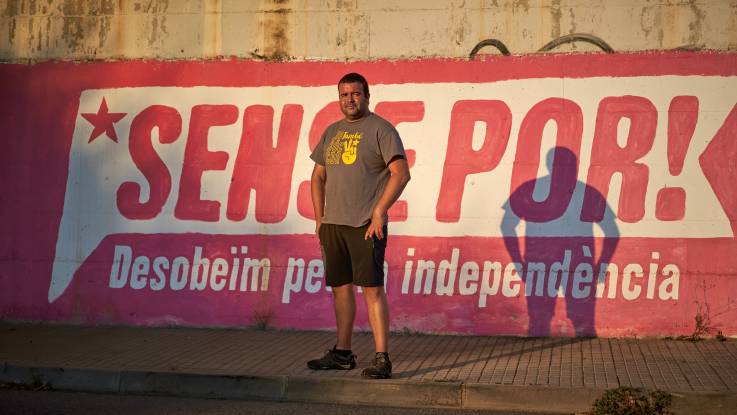
For Sabater, changing the system means moving away from growth at any price and towards sustainability and a stronger local economy. Steps to achieve this have included installing a small photovoltaic system on the roof of the community centre, which covers the building’s electricity needs in May and October, when neither the heating nor the air conditioning are running. And a few years ago, Som Energia was awarded the contract for the administration’s power supply in a public tender. This fits in well with Sabater’s philosophy of “the nearer, the better.” After all, he says, it is a Catalan cooperative.
A cooperative has no nationality
Is it though? Managing director Marc Roselló laughs. He has heard this question many times, yet he doesn’t have a straightforward answer: “Yes, Som Energia originated in Catalonia and two-thirds of its members live here,” he says. “But a cooperative has no nationality. It belongs to its members.” A statement from the cooperative’s supervisory board in September 2017 said that it was not Som Energia’s place to take a stance on the question of independence, but that it was in keeping with the philosophy of a democratic organisation that the people of Catalonia should be allowed to vote freely on the matter.
Roselló does not seem particularly concerned about the issue. He says that in the event of Catalan independence, he could imagine members setting up their own cooperatives in other parts of the country.
We see ourselves as a model for others.
Roselló is more concerned with the rapid growth of Som Energia, which now supplies power to around 86,000 households and businesses. This has been the result not only of the political autumn of 2017, which gained the cooperative several thousand new customers, but also the rule that each member can hold up to five electricity contracts – or transfer them to friends and family. Because demand is so high, the cooperative continues to pursue one of its biggest goals: to produce all its electricity itself.
This year, Som Energia’s own facilities will generate around 12 gigawatt hours of electricity – that’s less than five percent of the total amount of electricity it sells. Roselló would like to buy electricity from cooperative members who have solar panels on their roofs, but he complains that there is practically no regulated feed-in tariff for private households. Shared consumption by multiple households is apparently also not permitted. “The electricity market is still very centralised,” says Roselló. “It’s high time people were granted more freedom to produce their own energy.” He is optimistic about Spain’s new socialist government under Prime Minister Pedro Sánchez. After all, it has already created a new “super-ministry” for environmental protection, energy, and climate change.
We want to show that wind power is a part of it.
Citizen-owned energy on the rise
Som Energia is unwavering in its commitment to citizenowned electricity. Its Generación kWh project, for example, enables private individuals to invest in the production of renewable energy, and a total of 3.5 millions euros has been raised so far. One solar farm is in operation, another is under construction, and plans are in the pipeline for a small hydropower plant.
The cooperative also continues to work on its own energy generation projects. Its largest to date is a wind farm in northern Spain that will have a capacity of 24 megawatts – enough electricity for around 35,000 families. But this project is important to Roselló for another reason, too: “We want to show that wind power has a place in the mix and that we as a cooperative can also utilise its potential.” Som Energia has purchased the land, but some permits have yet to be obtained. “We haven’t had any clashes with local residents – partly thanks to the cooperative’s on-site members,” says Roselló. “They helped us get in touch with the right people and gave us tips on what to look out for.” One of the cooperative’s great strengths is that it has successfully established itself as a local partner in many regions.
Eight years after the founding of Som Energia, large corporations still dominate the Spanish electricity market – but they too now offer their customers green energy tariffs. “We are small fish,” says Marc Roselló. “But the big fish know about us, and we are an irritant because we offer a real alternative.” It is clear, therefore, that Som Energia has already achieved one of its most important goals: to show that things can be done differently.
Som Energia
+ Update (2024) + Som Energia was founded in 2010 in the Catalan city of Girona. Since our report in 2018, the number of cooperative members has increased from 50,000 to more than 84,000. The number of electricity customers has also risen – from 80,000 to more than 117,000. In addition, Som Energia is a good step closer to achieving its goal of producing all the electricity it supplies: in 2023, almost half of the energy sold came from its own facilities. That figure is set to rise further, as six additional solar parks are currently under construction. Once completed, they will supply 14,000 more families with power.
Link to the website of Som Energia
-
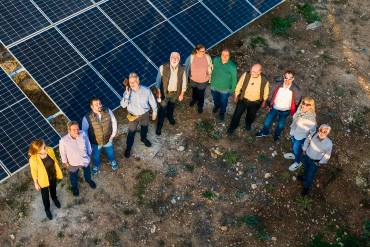
The greek miracle of the sun
A cooperative on the island of Crete is combining community energy with active solidarity.
-
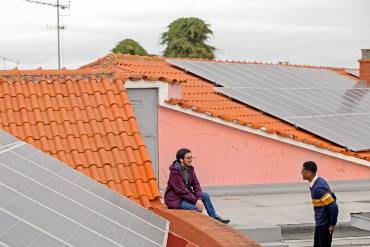
Solidarity through sunlight
Cooperative solar panels on the roofs of social facilities in Portugal show how citizens’ energy initiatives promote solidarity and community spirit.
